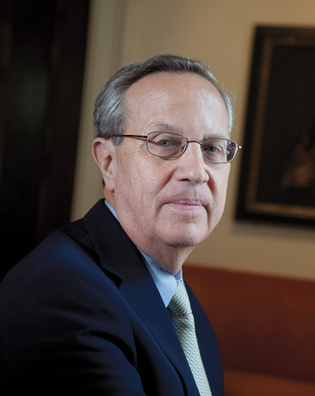 loading
loading
Q&A: Rick LevinDealing with sexual misconduct on campusRewriting complaint procedures.  Mark OstowView full image
Y: In November, you released a report you commissioned from a group of alumni on how Yale can better handle and prevent sexual misconduct. [See“Yale, alumni committee respond to Title IX complaint.”] What do you see as its key recommendation? L: The committee endorsed many of the efforts that we had already initiated, but their most important recommendation was that we strengthen our communication of Yale’s values as well as the resources available to students. They pointed out that one of the most effective ways to do that is to engage student leadership in helping to change the culture. Y: They noted that the hook-up culture on campuses “can blur boundaries of what consent means.” L: Many of us of an older generation find it hard to understand a culture in which sexual relations are often casual, often fueled by alcohol, and not connected to an intimate relationship. But for us to preach about the culture isn’t going to change behavior. The best role we can play is to encourage conversation, and to be teachers, not in the sense of being didactic but in the sense of encouraging people to think for themselves. Students need to understand when they are making poor decisions and placing themselves or others in harm’s way. Y: How do you initiate those conversations? L: As one initiative, this fall we appointed 40 Communication and Consent Educators, student leaders who are assigned to each residential college. They have already been a valuable resource in initiating conversation with their peers, raising awareness, and providing information. Last spring, a number of senior Yale administrators, including Dean Mary Miller, Provost Peter Salovey, Vice President Linda Lorimer, and several others, had a series of “listening lunches” with students. These two-way conversations helped the administration gain clarity about issues as students saw them, and also encouraged students to speak out. Y: One effort fell flat this fall, when freshman counselors were given a script about sexual consent to read to incoming freshmen, and said they weren’t comfortable with it. L: A script had been prepared to ensure that freshman counselors delivered a consistent message to their freshmen. When the counselors pushed back, we realized that they should have been given more preparation time and a hand in shaping the material. This is a work in process. We now have scheduled further freshman training for the month of January. Y: What are the biggest steps you’re taking in terms of Yale’s processes? L: There are two important changes. First, we have tried to make clear that if you have a concern or complaint, there is a preferred access point—SHARE [the Sexual Harassment and Assault Response and Education Center]. SHARE has skilled counselors who will give guidance and counseling that are sensitive to a person’s needs, while making sure that all understand that they have the right to make a formal or informal complaint, to go to the police, or to decide they do not want to pursue a complaint. Some Title IX complainants alleged that they felt pressured not to take formal action. We want to avoid that. It helps to have professionals who are familiar with all options available and can assist complainants in pursuing whichever avenue they choose. The other major change we are making is to rationalize our disciplinary procedures. Instead of separate procedures for the different schools, we now have the University-Wide Committee on Sexual Misconduct, which will impose consistent standards. And for any formal disciplinary hearing, the fact-finding will be done by professionals. The old format gave an often-beleaguered faculty member the extraordinary burden of being the fact finder. Now we will bring in attorneys with expertise to serve as fact finders. Y: In September the Yale Daily News interviewed a 2010 alum who said that after graduating she worked for a professor who sexually harassed her and refused to pay her for her work. She said Yale’s Office of Equal Opportunity Programs told her she had to sign a non-disclosure agreement about the harassment to be paid. Was that allegation true? And more broadly, what is Yale’s policy on asking students, or staff or faculty, for nondisclosure agreements when they say they have been harassed or mistreated? And what is your own philosophy? Nondisclosure agreements seem to con-flict with Yale’s values of free speech and free inquiry. L: I am not able to comment on the specific situation you mention. At Yale, as with most employers, when employee claims are settled with a monetary payment, even a small one, it is customary to have a nondisclosure agreement. If a complainant is not comfortable with that, he or she is free, of course, to pursue a complaint publicly through judicial channels. Y: You brought up free speech vis-à-vis the report’s suggestion that Yale respond quickly to offensive speech. You said Yale should “affirm at the very same time the university’s commitment to free expression.” L: We have done this on a number of occasions in dealing with offensive student expression. We use such occasions as a teaching moment. We defend the right of people to say what they want, and we do not punish people for exercising this right. But when appropriate, we point out that speech that aims to offend individuals or groups undermines the respect and civility that this community expects and deserves.
The comment period has expired.
|
|